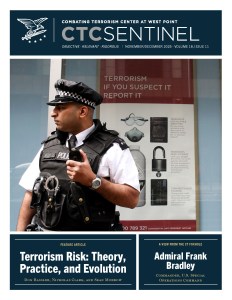From the Editors
Our cover article focuses on how we measure risk in the terrorism field, a task that is increasingly important in a resource-constrained environment. It “makes that case that if the United States is to remain serious about ‘risk-based’ counterterrorism, then terrorism risk assessment itself” should “be modernized conceptually, institutionally, and technologically to match the complexity and dynamism of the threat it seeks to understand.”
Our interview is with U.S. Special Operations Command (SOCOM) Commander Admiral Frank Bradley who describes a dynamic and changing threat landscape and how SOCOM has been evolving to meet and stay ahead of that challenge.
In the first analysis article, we take stock of the changing character of terrorism and U.S. counterterrorism today, evaluating how changes across the spread, structure, scale, and speed of terrorism are challenging the CT community in novel ways and at a time when CT resources are in shorter supply.
Daniel Milton examines why some Islamic State affiliates have failed to thrive and are currently “repressed.” He identifies potential causes for their decline—from military counter-responses to in-group conflict to an inability to gain traction among local populations.
Iselin Brady and Daniel Byman consider the realities of burden-sharing with non-traditional CT partners. “Because the United States is reluctant to deploy large numbers of its own forces to fight terrorists everywhere around the globe,” they write, “it will continue to rely on local actors, and this will often lead to strange bedfellows.”
In looking at the threat from foreign terrorist fighters, Kim Cragin finds “current trends are worrisome but not alarming.” She concludes: “If governments continue to … devote resources toward mitigating foreign fighter flows, the threat should remain in stasis.”
Finally, Michael Knights examines how Iraq’s “telecommunications industry is attracting the attention of U.S.-designated terrorist groups” in order “to generate threat finances and to control and monitor data” in the country.
Don Rassler and Kristina Hummel, Editors-in-Chief
 Skip to content
Skip to content

